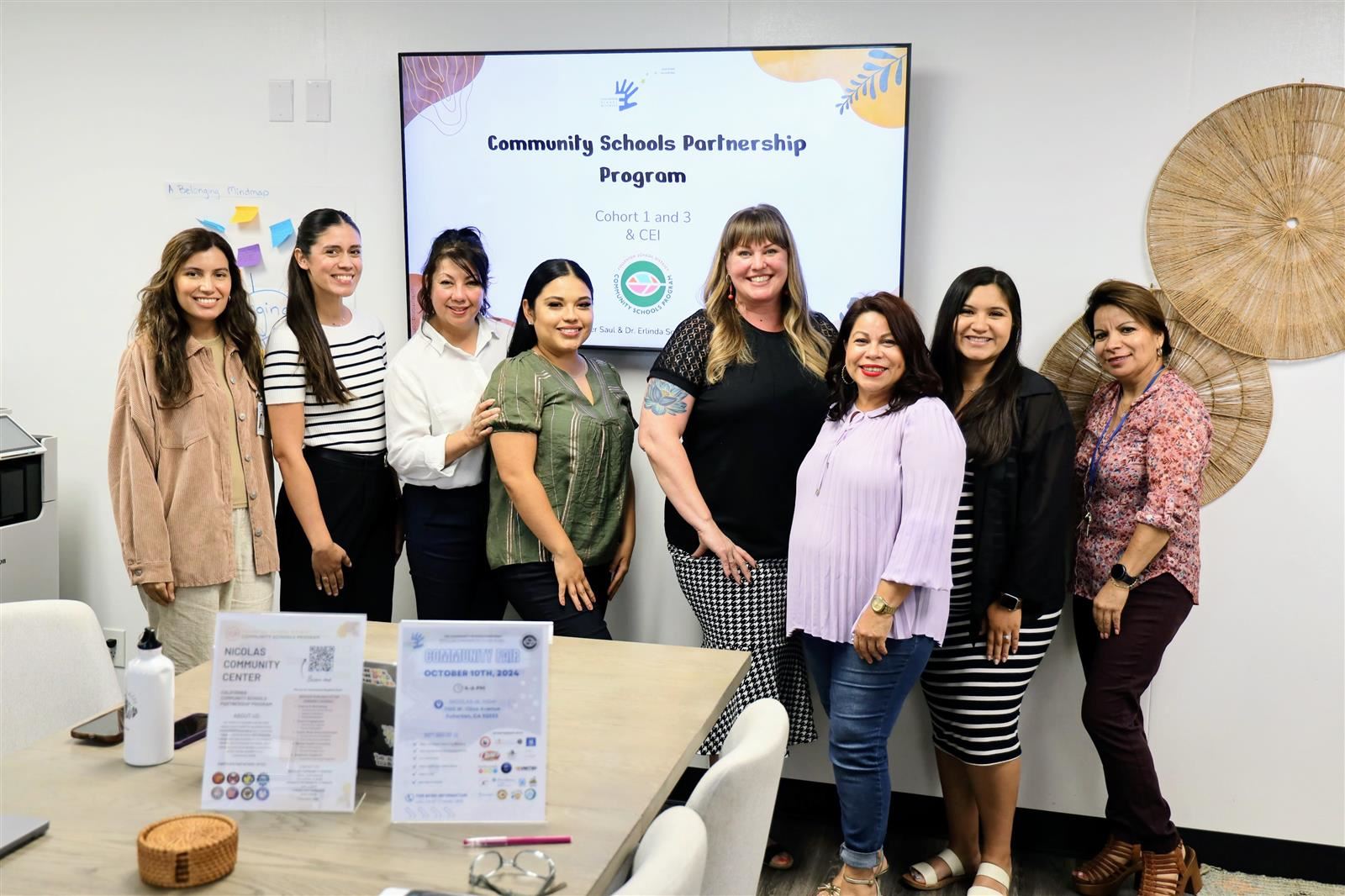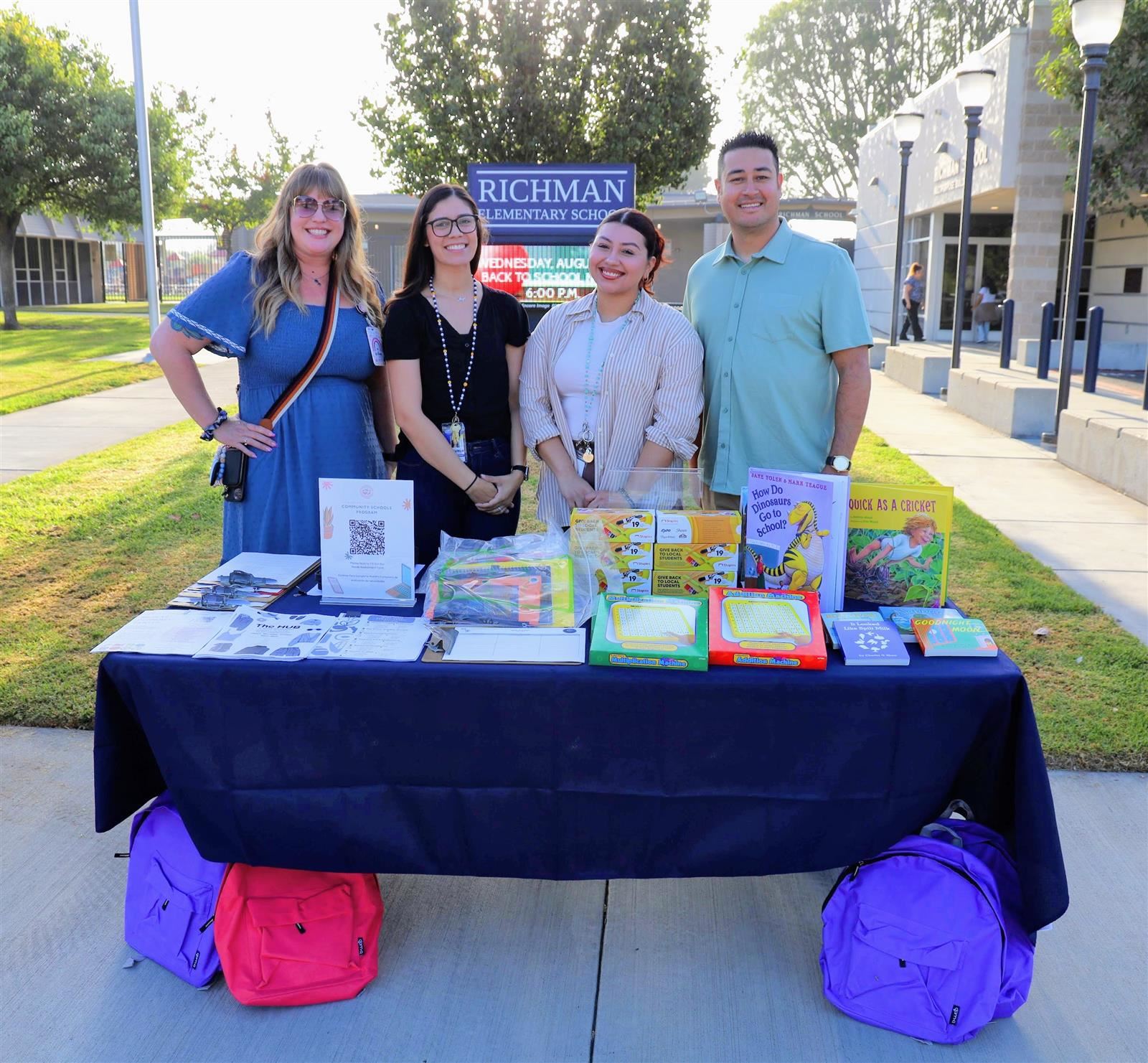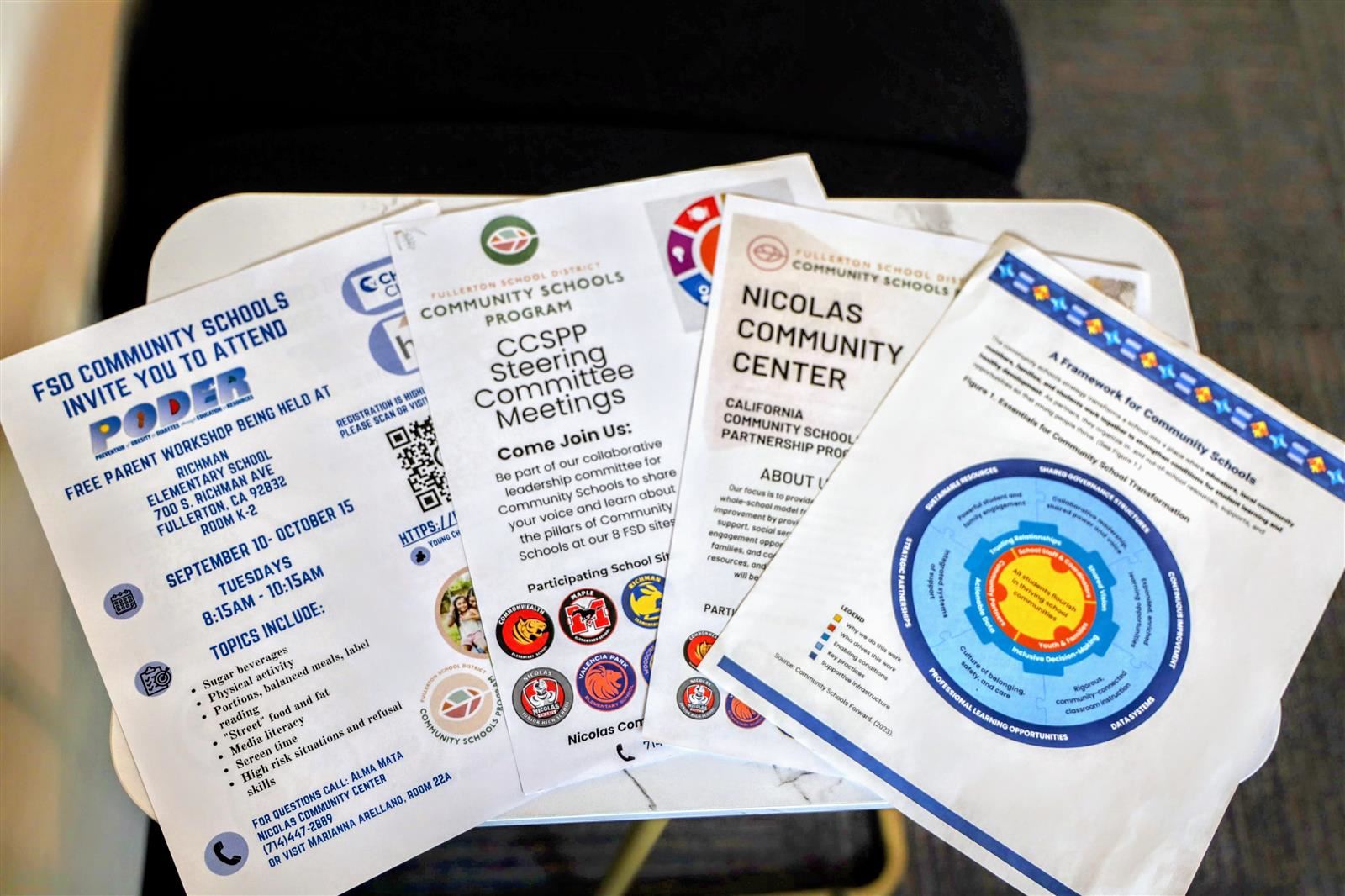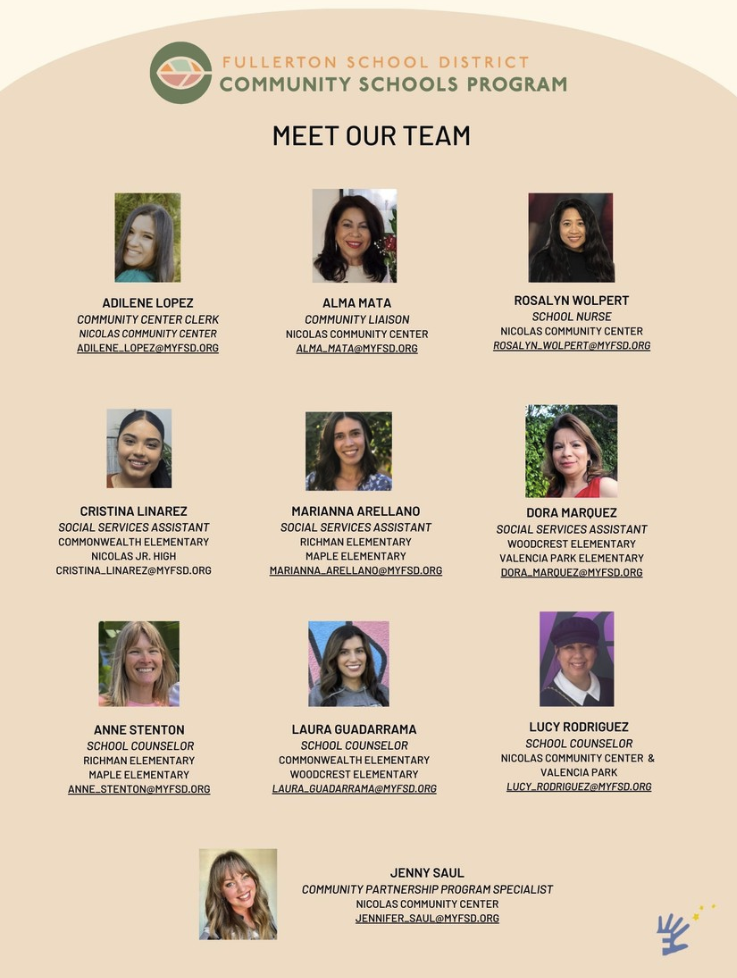-

Fullerton School District’s (FSD) Community Schools Partnership Program grows to eight FSD schools that provide wrap-around services for students academic and social-emotional development.
Fullerton School District’s (FSD) Community Schools Program is set to host its first-ever Community Fair on Thursday, Oct. 10, 2024, from 4 p.m. to 6 p.m. at the Nicolas Community Center, located off of Hill Avenue at 1100 W. Olive Avenue, Fullerton, 92833. This free event is open to all with no RSVP required and aims to educate and engage the local community on all that FSD’s Community Schools Program has to offer students and families. This Community Fair will feature free onsite student vision screening, flu vaccines, food, swag bags, health resources, and more all at no cost for all in attendance.
Of Fullerton School District’s 20 campuses, eight are currently in the Community Schools program. FSD has six schools in their third year of a five-year Community Schools Program implementation process: Commonwealth, Maple, Richman, Valencia Park, Woodcrest Elementary Schools, and Nicolas Junior High. Two more FSD schools are being onboarded into the program this school year: Orangethorpe and Pacific Drive Elementary Schools.
A natural question for those reading this may be, “What exactly are ‘community schools’?”
The FSD Feature above showcases the most recent presentation to FSD's Board of Trustees on FSD's Community Schools implementation
Considering that Community Schools were only first established in 2021 when California’s legislature passed the California Community Schools Partnership Act, codified in California Education Code 8900-8902, this is a fair question. The idea for Community Schools was motivated as a response to meet the needs created by the impacts of the COVID-19 pandemic on student learning and social and emotional development. Likewise, this model also sought to serve as support for the economic hardships presented during the pandemic, which compromised families’ abilities to keep access to housing, food, clothing, medical and mental health support, and more. Through this legislation, the California Community Schools Partnership Program (CCSPP) was born.
The Community Schools philosophy acknowledges that public schools are more than just places for educating youth; they are a hub of opportunity, collaboration, and care that spans far beyond students learning reading, writing, and arithmetic. Under the CCSPP, Community Schools bring together educators, families, and community partners to work collaboratively to meet the holistic needs of students and their families and help break down economic and social barriers that often cause opportunity and achievement gaps.
“In FSD, we believe that supporting the whole child is key to our students’ lifelong success,” said Leonel Talavera, FSD Board President.
“Through FSD’s Community Schools Program, we are able to expand our services to students and families who need it the most and connect them with important resources like food, clothing, family engagement opportunities, and whatever else they may need to help them see a brighter future ahead.”

At the beginning of the school year, FSD’s Community Schools Program hosted pop-ups before and after school to handout free school supplies and raise awareness about the program’s resources and services.
At their core, Community Schools are designed to be far-reaching. The CCSPP model seeks to provide students with improved access to resources that help them excel in and out of the classroom by helping families receive support in addressing challenges, such as access to healthcare, employment, and housing. This integrated approach fosters a sense of community and belonging, helping students develop academically, socially, and emotionally and bolstering families’ abilities to achieve sustainable stability.
This is the exact work FSD’s Community School Program is actively engaged in.
FSD’s Community Schools Program follows the CCSPP Framework, which identifies the following four pillars of all Community Schools:
-
Integrated Student Supports, which includes coordination of health, mental health, social-emotional support, social services, and early screeing and itnervention for learning and other needs.
-
Collaborative Leadership Practices, which includes professional development of educators and administrators to support mental and behavorial health, trauma-informed care, social-emotional learning, restorative practives, and other key areas.
-
Active Family and Community Engagement, which includes collaboration between home and school, cultivation and strengthening of community partnerships, and overal trust and relationship-building with families.
-
Expanded Learning Time and Opportunities, which includes before and after-school care and summer programs.

A few of the many programs and family engagement opportunities FSD’s Community Schools Program provides FSD families.
Another key hallmark of Community Schools under the CCSPP Framework is building trusting relationships to create a positive school culture and climate, which is a prominent feature of FSD’s Community Schools Program due to its caring, dedicated staff.
"One of the most powerful aspects of the Community School model is the way it fosters trusting relationships between students, families, and staff,” said Jenny Saul, FSD’s Community Partnership Program Specialist.
“Every member of our amazing team in this program works together to create a nurturing environment where families feel comfortable to speak their needs and are met with targeted support and where students know they are valued. These relationships are at the heart of what makes our Community Schools so impactful."
FSD’s Community Schools team is comprised of Saul, who heads up the program, three credentialed school counselors, three social services assistants, one school nurse, one community liaison, and a program clerk. In addition, some of FSD’s school campuses have additional support staff who work with FSD’s Community Schools team to help identify and build relationships with students and families in need.
The program’s main office is located off of Hill Ave toward the back of the Nicolas Junior High campus. It is a space that is immediately calming when visitors walk in, serving as an inviting place for families who may be experiencing big emotions as a result of the need support services. Saul and team also noted that students at Nicolas have taken to the welcoming environment of the office and come in during school breaks to decompress.

FSD’s Community Schools team roster recently shared in a program newsletter.
As of September 2024, FSD’s Community Schools staff have received nearly 1,000 responses to their Needs Assessment form, which is one of the first steps families take to be paired with services and support through the program.
Ultimately, one of the primary goals of the CCSPP is for the public schools that adopt the Community School model to become self-sustaining by creating robust relationships with community partners and put systems in place that ensure the Community School can remain a key resource and fixture in the community to serve students and families for generations to come.
Current FSD Community Schools Program partners include but are not limited to Bracken’s Kitchen (frozen meals for families), St. Jude (freezer storage for food pantries), Fullerton Express Pharmacy (vaccinations and medical needs), Parent Educational Classes (PODER, School Smarts, and more), Big Smiles, Vision to Learn, Vista Community Clinic, and mental health providers, including CareSolace, DayBreak, and Hazel Health.
FSD’s Community Schools Program will continue to identify and work closely with community partners to tailor services to the unique needs of FSD’s students and families, ensuring that all members of the school community have access to the support they need to succeed. In addition, each of FSD’s eight Community Schools have site-based advisory committees to help ensure family input and involvement help guide the development of the program. For the most recent update on FSD’s Community Schools Program, tune into this presentation to the Board of Trustees.
To learn more about FSD Community Schools Program and reach out for resources or to find ways to connect and support as a community partner, visit bit.ly/FullertonCommunitySchools.
The Fullerton School District (FSD) is located in northern Orange County, California, and serves over 11,400 students in transitional kindergarten (TK) through eighth grade. FSD is home to 15 elementary schools, two TK through eighth-grade schools, three junior high schools, and a distance learning and home school program. FSD features unique programs for students, including a Dual Language Academy for Spanish and Korean languages; a Performance Academy Sports Program that offers a traditional in-person learning experience with time for advanced athletic training integrated into the school day; and robust before, after, and summer school programs. The mission of the Fullerton School District is to work collaboratively with the community to provide an innovative, high-quality educational experience for all students in a safe learning environment. FSD’s motto, “Great Schools - Successful Kids,” signifies that all FSD students will be given the tools and instruction to achieve academic excellence, hone interpersonal skills, and develop technological expertise to contribute as productive citizens in a democratic society. To learn more about the Fullerton School District’s award-winning schools and programs, call (714) 447-7400 or visit www.fullertonsd.org.
-
Select a School...
Select a School
- Acacia Elementary
- Beechwood School
- Commonwealth Elementary
- Fern Drive Elementary
- Golden Hill School for Creative and Performing Arts
- Hermosa Drive Elementary
- Ladera Vista Junior High School of the Arts
- Laguna Road Elementary
- Maple Elementary
- MyConnect Academy
- Nicolas Junior High
- Orangethorpe Elementary
- Pacific Drive Elementary
- Parks Junior High
- Raymond Elementary
- Richman Elementary
- Fisler School
- Rolling Hills Elementary
- Sunset Lane Elementary
- Valencia Park Elementary
- Woodcrest Elementary

